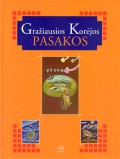 Original language:
Korean
Original language:
Korean Translated from: Korean
Composers: Seo, Jinseok
Translated by: Seo, Jinseok
ISBN: ISBN 5-417-00877-X
Published in: Vilnius
Published on: 2005
Publisher: Mintis
“Graziausios Korejos pasakos” is a collection of nine Korean folk tales. The book was compiled and translated by Jinseok Seo, a Korean person who is studying Baltic studies, and illustrated by Eunok Kim Kang, a Korean woman currently living in Lithuania.
There is a saying that one of the best ways to learn about foreign culture is through tales and folklore. That is why while reading this collection of tales Lithuanian readers will be able to explore Korean culture, history and traditions in a funny way. Since from Lithuanian perspective Korea still is quite exotic and not that well known, these tales can help anyone to get to know this faraway place better. In Korean folk tales the main protagonists are usually ordinary, sometimes even mundane people, also all kind of animals such as bears, tigers, turtles and so on. Sometimes these tales involve kings, nymphs or even Gods, who interfere and help good people when they are in some sort of trouble. Best character traits are considered to be respect shown to the elders, mercy, strong believe in God, friendliness and wisdom. In these Korean tales villains do not get a bad ending, instead they learn from their own mistakes and become good people. The righteous characters usually have to suffer and fight many obstacles until they can become happy.
Some of these tales are funny, some sad, scary or even a little bit mystic but every one of them also has a hidden life lesson teaching readers understanding, forgiveness and that all actions, no matter good or bad, always have consequences. Also, as was mentioned before the main characters are usually ordinary people so readers can easily relate to their situations. That is what makes these tales so magical and interesting for everyone no matter if reader is an adult or a child.
